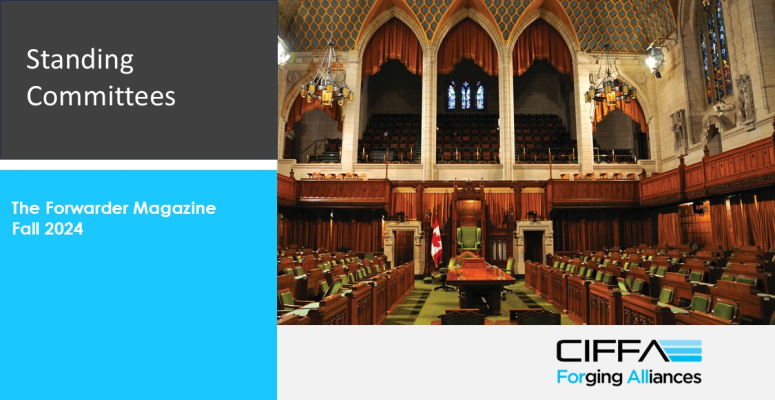
Standing Committees: An Opportunity to Testify
(Shared from The Forwarder Magazine, Fall 2024. View digital version.)
In the House of Commons, Standing Committees have been created that represent the “ruling” party as well as representatives from the opposition and other representative parties in the House.
These committees examine various aspects of policy, and CIFFA’s Executive Director Bruce Rodgers, and Director, Policy and Regulatory Affairs Julia Kuzeljevich, have been called to witness at both the Standing Committee on Transportation, Infrastructure and Communities and also the Standing Committee on International Trade (CIIT). The latter held a meeting that took place on Thursday, May 2, 2024. CIFFA was called to present before the committee on issues affecting trade in Canada.
The following is CIFFA’s Opening remarks to the Standing Committee. These are followed by a question and answer session from the committee chair and members.
“Madame la présidente et mesdames et messieurs les membres du Comité, au nom de l’ATIC, l’Association des transitaires internationaux canadiens, nous vous remercions de nous donner cette occasion aujourd’hui de nous adresser à vous.
Very briefly for those who may not know, freight forwarders take control of shipments – be they imports or exports – and move them to the ultimate customer by whatever transport mode is most cost efficient.
We have about 10,000 members and they handle about 80% of freight traffic in Canada.
And as our association also represents port truckers (called drayage operators), customs brokers and other services sectors, we can legitimately claim to represent all the key players in Canada’s supply chain.
The labour disruptions at West Coast ports this last summer were a fairly serious blow to our members and our customers.
But we feel it was also a sign that we need to start moving beyond the traditional – and wasteful – pattern of labour confrontation that has characterized the Canadian port industry.
The year 2023 was certainly the year of labour disputes in ports. We saw strikes in Canada’s west coast and on the U.S. west coast as well.
In the south east of the U.S. a strike was averted – temporarily – by a contract extension.
Now we are looking forward to a possible strike in the Port of Montreal.
I canvased our membership in anticipation of this appearance asking about impacts of the West Coast strike last summer and got reactions such as this:
“.. the most frustrating part of the Vancouver situation for me seemed to be the complete lack of understanding of supply chains in Canada. Media coverage focused on the impact to B.C., without any understanding of the volume of cargo arriving via B.C. ports, destined for inland centres…most notably Southern Ontario.”
This underlines a point we want to make to the committee: the victims of strikes aren’t the workers – who generally get their back pay upon settlement – nor the business managers. The victims are ordinary small businesses. Nobody compensates them for their losses.
Specific examples of impacts to a forwarder’s customers:
“Import – Due to the late delivery of seasonal import items, we had a customer miss a deadline, and the resulting order. As these goods are seasonal, they have been unable to find another buyer. This customer is sitting on this inventory, and because of the money tied up in this, are unable to purchase other seasonal goods and keep their business moving forwards.
Export – We have a customer who dealt with an overseas buyer on longer contracts of sale (90 days to 1 year). As a result of the continued supply chain issues that have been happening in Canada, this buyer is now sourcing the majority of the volume from elsewhere in the world, and the Canadian exporter get a small portion of the volume they carried, and contracts of sale are on a single shipment of limited (30 day) basis.”
There should be no doubt in anyone’s mind that disruptions divert traffic. Nor should you doubt that those disruptions can lead to permanent changes in shipping routes.
An interview with a supply chain manager ** in Inside Logistics in November made this point: “In the past two years, we’ve seen East Coast ports steal import volume from West Coast ports as shippers looked to avoid backlogs and delays.“
Now as we look forward to the possibility of another disruption in the Port of Montreal, our members are seeing shippers begin to move away and find more reliable routings. There is no telling if these moves are temporary or permanent.
Inflation costs have driven up worker demands while traffic has begun a significant decline – a decline that continues today. We fear it will be a difficult negotiation.
To conclude my remarks: Following the west coast debacle this summer, Labour Minister O’Regan talked about an in-depth examination of the port industry, with a focus on the future of port labour. We would certainly be interested in such a study.
We see European employers and unions cooperating to ensure competitiveness and decent wages, yet in Canada we seem condemned to strikes as a requirement of negotiation. We hope and believe it’s time for a better approach.”
Notes
** Glenn Kopeke, who is general manager of network collaboration at FourKites – interviewed in November by Inside Logistics;
Comment by forwarder:
“The overall impact to us was not too significant, compared to what happened in Montreal a few years ago, which was brutal. I think a lot of this had to do with the fact shipping volumes are down significantly and in terms of getting cargo moving after the strike ended it actually cleared up pretty quickly. Coupled with this, many of our clients are still dealing with inventory surplus, again which would mitigate the impact of such a strike to a certain degree.”



